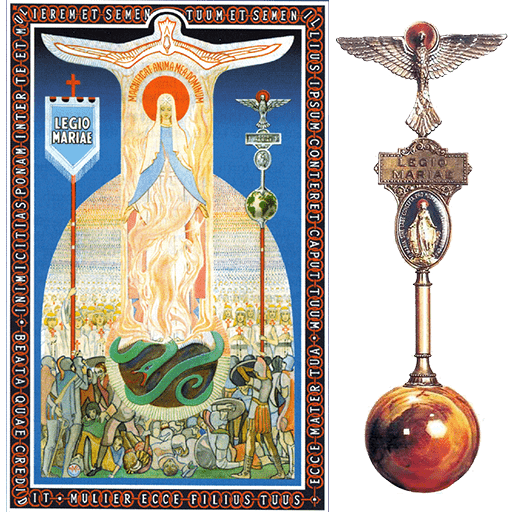Frank Duff and Ecumenism
Every year the January meeting of Concilium takes place during the Octave of Prayer for Christian Unity. This is especially providential for the Legion because it annually reminds us of one of the fundamental commitments of our Founder Frank Duff and consequently of the Legion, namely, Ecumenism. We celebrate the centenary of the Octave of Prayer for Christian Unity this year and the theme is ‘Pray Always’. This constant prayer for unity has been answered wonderfully in so many ways even though we are all aware that the road ahead is still long and full of many obstacles. We thank the Lord for the good achieved and we pray and work for ever greater degrees of inner and visible unity among all Christians. It is a sad anomaly that Christians who so sincerely and generously love our Lord should be so divided and separated from each other. Ecumenism is the prayer and work undertaken to try and bring us all into unity in the one visible Body of Christ, His holy Catholic Church.
Of course, prayer for Christian Unity did not start with the Octave of Prayer but began with Our Lord’s own prayer at the upper room the night before he died. ‘May they all be one Father as you are in Me and I am in You.’ And down through the centuries whenever Christians separate themselves from the One True Church, God raised up great saints and leaders who have prayed and worked for their re-union with the Mother Church. I like to think that God raised up the Legion through Mary as one of those special instruments of Ecumenism. Let us just recall briefly three major elements in the ecumenical activity of Frank Duff as an example and inspiration for the Legion throughout the world.
First Frank sought actual personal contact with non-Catholic Christians. His ecumenical spirituality made him seek to meet and greet and befriend other Christians. He believed that every authentic apostolate was a ministry of friendship. His approach was the direct opposite of the armchair ecumenist who never gets around to actually engaging with other Christians. All his long life he counted among his friends many Protestants of many different denominations. Personal contact was his goal and authentic friendship his method. But of course all Legionary Apostolate is preceded and accompanied by habitual prayer. This principle was always especially important for our Founder in his ecumenical work.
Around 1940 Frank founded a prayer movement called a League for the Reunion of Christendom. He composed a prayer for unity and each phrase of the prayer had a reference to a particular text of Scripture. Each person, Catholic or Protestant who agreed to undertake to pray this prayer would be enrolled as members of the League. I mention the League for Reunion simply to indicate the commitment of Frank to what is sometimes called ‘Spiritual Ecumenism’ today. Another sign of his conviction about spiritual ecumenism was the retreat movement he started for non-Catholics in the early forties. These retreats were a great success and are still being organised in some parts of the Legion world.
The second principle of his approach to ecumenism can be summed up in the word: Dialogue. He founded the Mercier Society in 1941 precisely for the purpose of providing a forum for dialogue with non-Catholics in a spirit of mutual respect and openness and better-informed views of each others positions. This Society ceased to operate due to the ecclesiastical discipline at the time. After the Second Vatican Council when ecumenism was given a whole new lease of life, Frank started the Pauline Circle, which had the same aims as the Mercier Society of fostering mutual understanding and goodwill. Frank attended a meeting of the Pauline Circle on the 4th of November 1980 just two days before he died. He was ecumenical in every fibre of his being until the very end.
Finally, Frank had a burning desire to invite non-Catholics to full membership of the Catholic Church. He found it tragic that they were deprived of the Real Presence of Our Lord in the Eucharist, the doctrinal basis and practice of true devotion to Mary and many other aspects of the Catholic faith and way of life. Sometimes the word conversion has taken on certain negative connotations as though it implied some undesirable attitude to non-Catholics. But for Frank it involved an act of supreme love to invite a non-Catholic into the fullness of the Catholic faith. The invitation to conversion would always be offered in a spirit of great gentleness, without even a trace of aggression or superiority but simply in a spirit of friendship and respect. As the saying goes, we only propose the faith, we do not impose it. But for Frank it would be a terrible dereliction of our Christian duty not to at least propose our Catholic Faith to our non-Catholic friends. For him the invitation to conversion was the final but indispensable part of ecumenism as he understood and practiced it. It also provides a guideline on ecumenism for the Legion in every part of the world. Everywhere in the Legion world we should be organising and taking part in the Octave of Prayer for Christian Unity. That is the very least our founder would expect of us.
